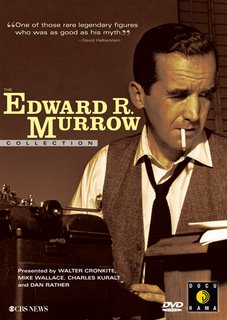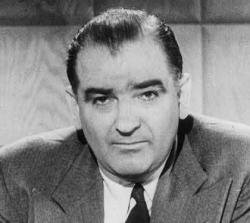Good Night and Good Luck


George Clooney’s courageous film, Good Night and Good Luck, gives a quick snapshot of one brief conflict between American liberalism, personified by the TV broadcaster Edward R. Murrow, and McCarthyism, personified by the “Junior Senator from Wisconsin.” As Clooney himself acknowledges, his motive for producing the film is to shed light on the current tension between civil liberties and security in the United States. There is a glaring contradiction between such draconian post-9/11 measures as The Patriot Act and the traditional liberties that the constitution afforded to Americans. What the film shows is that this issue is not a new one, but rather revives anxieties that ripped the fabric of American society in the 1950s. Today civil liberties are jeopardized by the need to restrain terrorism. In the fifties, they were jeopardized by the need to restrain Communism.
I admire the film and feel grateful for its contribution to the current debate, not just within the United States, but around the world. At the same time, I believe it is useful to contextualize those debates. Just as there are today ongoing realistic problems that have to be taken seriously (the ongoing prospect of further terrorist acts in the United States, plus the ongoing wars in Afghanistan and Iraq) there were realistic concerns during the 1950s that made some people consider McCarthy a hero, not a demogogue.
First, it should be pointed out that McCarthyism was neither the beginning nor the end of anti-communist hysteria. It was the peak of a populist movement that arose right after World War II. It was actually Harry Truman who introduced the early security measures that began to intimidate citizens of leftist persuasions. By 1948, when the left-leaning Henry Wallace ran for the presidency, his constituency was already being tarred with charges of disloyalty.
When I arrived in Berkeley as a first-year student in September 1949, the Loyalty Oath controversy was just beginning. I joined a committee to oppose it, not because I was pro-Communist, but because I believed in the same civil libertarian principles that Murrow would later defend in his fight against McCarthyism. Many Berkeley faculty members resigned and moved away that year rather than sign the oath. I lived in an inter-racial co-op more than a decade before the Civil Rights movement began, and a few of my housemates had good reason to fear persecution by Anti-Communist zealots, as I learned only many years later, for they had indeed been active Communists, and were already chary in 1949 about revealing that fact.
The late 1940s and early 1950s was a time of great anxiety in the United States. Anti-colonialism was spreading around the world after India gained its independence, but few of those nationalistic movements restricted themselves to the nonviolent methods of Gandhi. Until 1953 Stalin was still alive, still maintaining a totalitarian system that equaled or even exceeded that of Hitler, though he could not match the 70 million killed by his Communist contemporary, Mao. Precisely in August 1949 the Soviets exploded their first atomic bomb — far earlier than Americans had expected. It was already wartime (the Korean War began in June 1950 and continued until July 1953) and many expected the Soviet Union to enter the fray, using its tattered army and its new atomic weapons. I remember lying in bed at night, listening to every plane overhead and freezing in terror, waiting for the sounds of bombs. Nor was this totally neurotic; the Soviets had blockaded Western rail and road traffic to West Berlin from June 1948 until May 1949. The resolution to the impasse occurred only when the Soviets did not block airlifts of food and other supplies to Western-held sectors of Berlin.
It is not clear how many leftists in the West were aware of the extent of Stalin’s repressions. Certainly excuses were made — and occasionally still are — by Marxists who believed that equality of material resources should be regarded more highly than democracy or the rule of law. In any case, after Khrushchev came to power, he publicized Stalin’s crimes against humanity, and no one in the west could plead ignorance any longer. The grounds for fear were not trivial.
It was precisely these concerns for security that were cited by everyone who wanted to hunt down and persecute pro-Communists in government and other high positions — including Hollywood. McCarthyism was not a departure from the previous period of anti-Communism, but rather its culmination. Or, in fact, not really even its culmination, for after McCarthy had been disciplined, the fear of subversion continued. Actually, it was never officially abolished. Eventually, after Gorbachev had persuaded Westerners that he was serious about abandoning the system that he headed, Westerners had no longer any reason to fear Communists. Indeed, the last militant Communist movements on earth today are in Nepal and North Korea, and they appear more pathetic than frightening.
What part did Edward R. Murrow play in this? He was brave; he paid a price for his bravery, and he did help change the nature of the debate in the United States. It was not he, but the Senate itself, that curbed McCarthyism. The true value of his contribution was not in demonstrating that Communism was weak or unthreatening, for in those days it was neither. But he contributed greatly by showing the methods that civilized people should use when fighting a political enemy. If we are unfair, we become no better than the forces against which we must struggle. Like Gandhi, who insisted that the means of a struggle is as important as its ends, Murrow reminded Americans that their liberal tradition was worth preserving, and that they must adhere to it even while defending it.
American have largely forgotten that truth. For that reason, Clooney’s movie is wonderfully timely. We all need to see it.



0 Comments:
Post a Comment
<< Home